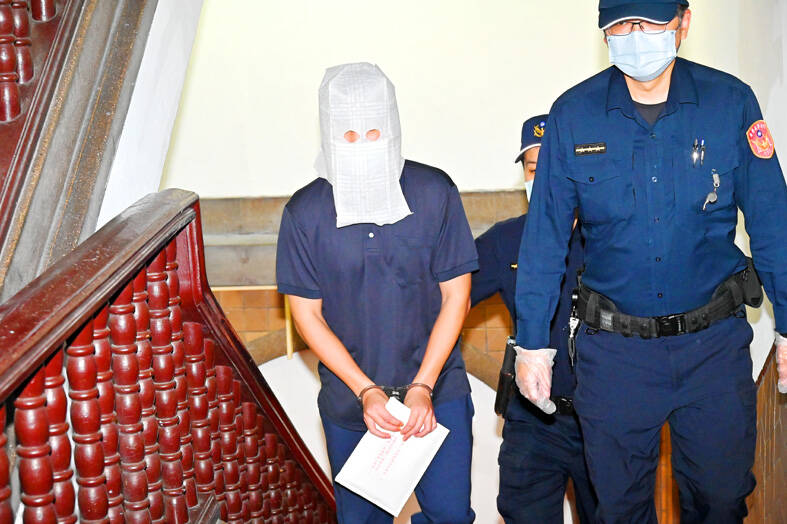Ten former and current military officers were yesterday indicted on charges of spying for China, including two who allegedly filmed themselves pledging loyalty to Beijing.
The High Prosecutors’ Office requested life imprisonment for the suspects in light of the severity of the crime.
The 10 active-duty and retired officers included members of the 601st Brigade of the Aviation Special Forces comprising attack helicopter squadrons and elite combat units in charge of defending northern Taiwan, including Taipei.

Photo: Tu Chien-jung, Taipei Times
The other suspects came from Huadong Defense Command, in charge of defending the eastern coast; Kinmen Defense Command, in charge of defending Kinmen and Matsu; and one from the army’s Chemicals, Biohazards and Radiation Training Center based in Taoyuan tasked with defense against chemical and biological warfare.
Prosecutors charged them with treason in accordance with a provision in the Criminal Code, which was amended in May, which states that “any person colluding with a foreign state or its agent” with the intent to start a war against the nation may be sentenced to death or life imprisonment.
Evidence showed that two active-duty officers, surnamed Wu (吳) and Lu (陸), were paid to film videos declaring their willingness to surrender to Chinese People’s Liberation Army forces, the indictment read.
“Active-duty soldiers pledging their allegiance to the Chinese Communist Party is an extremely vicious act,” it said.
Three of the suspects were accused of recruiting active-duty servicepeople to collect military information to “develop a network for China,” the High Prosecutors’ Office said in a statement.
The four officers that they enlisted were charged with handing over “multiple military secrets” to Beijing in exchange for money, it said without elaborating.
The 10th suspect was accused of stealing military secrets from a safe at his workplace.
“These 10 suspects are in active service or retired military officers, and receive salaries or pensions from the government. They have or had held positions in the armed forces, and were educated, trained and cultivated for many years by the government, and tasked with the duty of defending the nation,” the indictment said.
“Therefore the suspects are well-aware that loyalty to the nation is the most fundamental obligation of a soldier. However, they chose to betray the nation, broke their oath to protect state secrets and breached their duties as soldiers to defend the homeland,” it added.
“Due to personal greed, they betrayed the nation and its people by leaking and passing on numerous documents and materials pertaining to military and state secrets, which seriously harmed national security. It is painful to point out how these suspects betrayed their fellow soldiers in active duty by committing treason. They should therefore receive the severest punishment under the law,” it said.
Yesterday’s indictment was the latest in a recent string of espionage cases in the nation.
Last month, a retired air force colonel was sentenced to 20 years in prison for spying for Beijing and handing over confidential national security information.
In August, a father and son duo were indicted for recruiting two soldiers who allegedly helped them gather information for China about Taiwan’s Han Kuang military exercises.

A car bomb killed a senior Russian general in southern Moscow yesterday morning, the latest high-profile army figure to be blown up in a blast that came just hours after Russian and Ukrainian delegates held separate talks in Miami on a plan to end the war. Kyiv has not commented on the incident, but Russian investigators said they were probing whether the blast was “linked” to “Ukrainian special forces.” The attack was similar to other assassinations of generals and pro-war figures that have either been claimed, or are widely believed to have been orchestrated, by Ukraine. Russian Lieutenant General Fanil Sarvarov, 56, head

A magnitude 7.0 earthquake struck off Yilan at 11:05pm yesterday, the Central Weather Administration (CWA) said. The epicenter was located at sea, about 32.3km east of Yilan County Hall, at a depth of 72.8km, CWA data showed There were no immediate reports of damage. The intensity of the quake, which gauges the actual effect of a seismic event, measured 4 in Yilan County area on Taiwan’s seven-tier intensity scale, the data showed. It measured 4 in other parts of eastern, northern and central Taiwan as well as Tainan, and 3 in Kaohsiung and Pingtung County, and 2 in Lienchiang and Penghu counties and 1

SAFETY FIRST: Double the number of police were deployed at the Taipei Marathon, while other cities released plans to bolster public event safety Authorities across Taiwan have stepped up security measures ahead of Christmas and New Year events, following a knife and smoke bomb attack in Taipei on Friday that left four people dead and 11 injured. In a bid to prevent potential copycat incidents, police deployments have been expanded for large gatherings, transport hubs, and other crowded public spaces, according to official statements from police and city authorities. Taipei Mayor Chiang Wan-an (蔣萬安) said the city has “comprehensively raised security readiness” in crowded areas, increased police deployments with armed officers, and intensified patrols during weekends and nighttime hours. For large-scale events, security checkpoints and explosives

‘POLITICAL GAME’: DPP lawmakers said the motion would not meet the legislative threshold needed, and accused the KMT and the TPP of trivializing the Constitution The Legislative Yuan yesterday approved a motion to initiate impeachment proceedings against President William Lai (賴清德), saying he had undermined Taiwan’s constitutional order and democracy. The motion was approved 61-50 by lawmakers from the main opposition Chinese Nationalist Party (KMT) and the smaller Taiwan People’s Party (TPP), who together hold a legislative majority. Under the motion, a roll call vote for impeachment would be held on May 19 next year, after various hearings are held and Lai is given the chance to defend himself. The move came after Lai on Monday last week did not promulgate an amendment passed by the legislature that